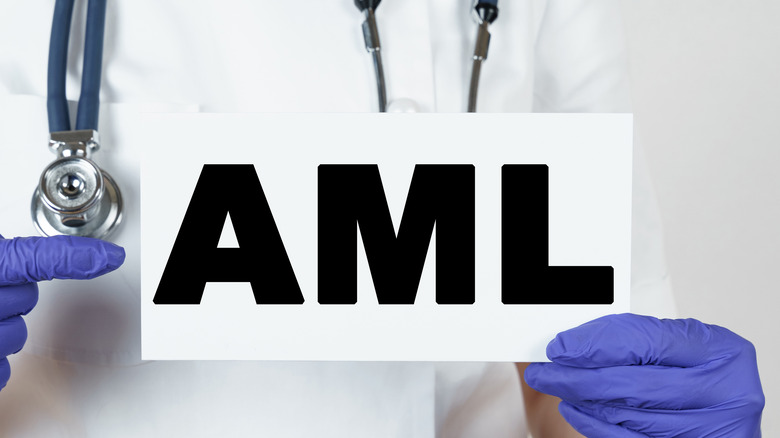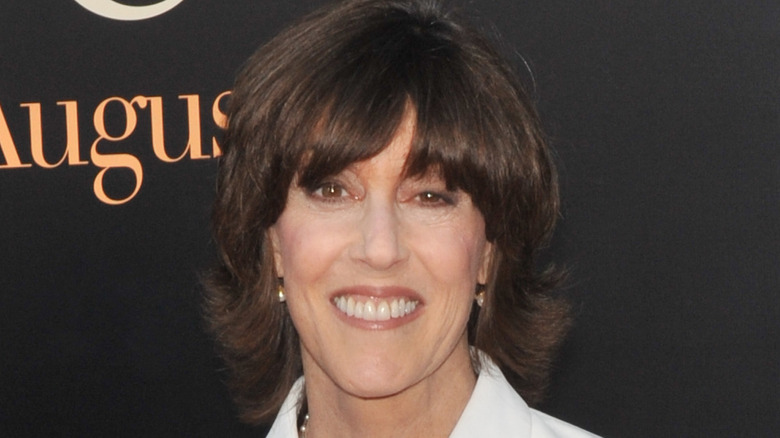Norm Macdonald's Cause Of Death Explained
Norm Macdonald, the Canadian-born actor and comedian, perhaps best known for his stint as SNL's "Weekend Update" anchor, died on September 14 after nine years with cancer. He was 61 years old.
Brillstein Entertainment, Macdonald's management firm, announced his death to Deadline. The news was a surprise to many, as he kept his diagnosis under wraps. "He was most proud of his comedy," said the comedian's longtime producing partner and friend Lori Jo Hoekstra, who was reportedly with him when he died. "He never wanted the diagnosis to affect the way the audience or any of his loved ones saw him. ... Norm will be missed terribly," she added.
Macdonald's niece, Andrea Macdonald, took to Twitter the week following her uncle's death, writing, "Today we officially say goodbye to Uncle Norm. It's been a week and it still feels strange to refer to him in the past tense. My Uncle Norm was a lot of things to me while I was growing up." She added, "He was always kind and always strange in a very lovable way. The tributes are both heartwarming and heartbreaking at the same time."
What kind of cancer did Norm Macdonald have?
According to Norm Macdonald's brother, Neil Macdonald, the beloved comedian's cause of death was leukemia. "He kept it quiet because he didn't want it to affect his comedy," Neil explained in an interview with CBC News. The University of Colorado Cancer Center further described Macdonald's form of cancer as "acute leukemia."
There are a number of types of leukemia, but as a general category of cancer, the Cancer Center defines it as "a blood cancer that originates in the blood and bone marrow." It "usually occurs when the body creates too many abnormal white blood cells and interferes with the bone marrow's ability to make red blood cells and platelets." Roughly 33% of all blood cancer diagnoses are some form of leukemia, which was reportedly the sixth most deadly form of cancer between 2012 and 2016 (via University of Colorado Cancer Center).
Understanding acute leukemia
The two main forms of acute leukemia are acute myeloid leukemia (AML), which mostly affects older people, and acute lymphoblastic leukemia (ALL), which is mostly found in children. However, the University of Colorado Cancer Center noted that AML is "pretty uncommon at the age that Norm Macdonald was."
Those who are diagnosed with acute leukemia experience sudden onset. It can often be very aggressive and, as a result, patients often have shorter life expectancies. Patients with the other general category of leukemia known as chronic leukemia frequently live longer than those diagnosed with acute leukemia. However, Dr. Dan Pollyea, clinical director of leukemia services at the University of Colorado School of Medicine, explained that people diagnosed with acute leukemia tend to either be cured or have a short life expectancy.
Macdonald survived for nearly a decade after his diagnosis, which, in light of Dr. Pollyea's prognosis for those with acute leukemia, would likely make Macdonald's case a rare occurrence. Those diagnosed with AML typically survive up to five years, according to the American Society of Clinical Oncology.
Leukemia: causes, risk factors, and symptoms
At this time, there is no scientifically confirmed cause for leukemia. The best guess, per the Mayo Clinic, is that leukemia "seems to develop from a combination of genetic and environmental factors." Though, experts believe a person is more at risk for developing leukemia if they smoke, have certain genetic disorders such as Down syndrome, are often exposed to chemicals, or have a family history of leukemia.
Health experts believe that leukemia ends up forming as a result of a mutation in the blood cells' DNA. In healthy cells, DNA instructs the cells to grow and die at a regular rate. When cells are mutated, DNA instructs the cells to continue to grow and divide. As a result, the growing amount of abnormal cells that form due to errant blood cell production ultimately overwhelm the number of healthy cells in the bone marrow. This leads to fewer healthy white and red blood cells and platelets, which is the scenario that typically leads to leukemia.
While symptoms can vary depending on the type of leukemia, some common signs include persistent fatigue or weakness, fever, unintentional weight loss, swollen lymph nodes, easy bleeding or bruising, excessive sweating at night, and bone pain or tenderness.
What are the treatments for leukemia?
Dr. Dan Pollyea told the University of Colorado Cancer Center that there are unfortunately no screening tests available for leukemia. However, if any combination of commonly known symptoms persists for a long period of time, it is in your best interest to see your doctor.
According to WebMD, some forms of chronic leukemia may not need treatment if the patient remains stable. Otherwise, there are a number of approaches doctors can choose to take depending on the leukemia type and the overall health and age of the patient. These can include chemotherapy, radiation, stem cell transplant, among others.
As of this writing, there is no cure for leukemia, although it is possible for a patient to go into remission following treatment (via Healthline). Remission is a period during which doctors can no longer detect cancer in the body, though there remains the possibility of recurrence. The good news is that there are ongoing clinical trials seeking to discover screening methods and more effective treatments. The website for the National Cancer Institute at the National Institutes of Health includes a list of trials accepting patients.
Norm Macdonald isn't the only celeb to have been diagnosed with leukemia
Norm Macdonald is not the only celebrity who has been diagnosed with leukemia. TV star Evan Handler was diagnosed at the age of 24 with acute myeloid leukemia and given six months to live; however, Handler went on to have an active acting career, playing many roles, including Charlotte's husband on HBO's "Sex and the City" after his successful treatment (via HealthGrades).
Ashley Park, who plays the edgy and effervescent Mindy Chen on the beloved Netflix series "Emily in Paris" and who also delighted Broadway audiences as Gretchen Wieners in the musical "Mean Girls," was diagnosed with leukemia when she was a teenager — just as she was preparing to make her Broadway debut. Park went through chemotherapy and, after avoiding the topic for years, Park told Cosmopolitan in a 2020 interview that she now sees views going through cancer as her "most defining quality as an artist and a person."
Additionally, the famed Nora Ephron also had leukemia, according to The New York Times. Like Norm Macdonald, she, too, was diagnosed with, and died as a result of, acute myeloid leukemia (via University of Colorado Cancer Center).






